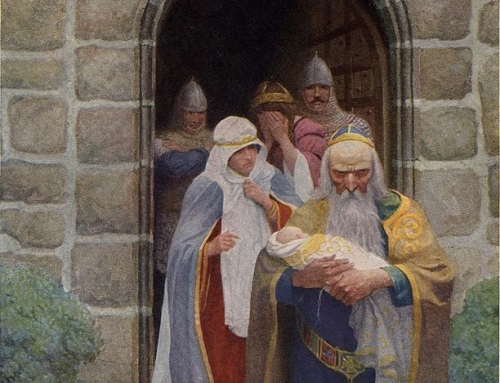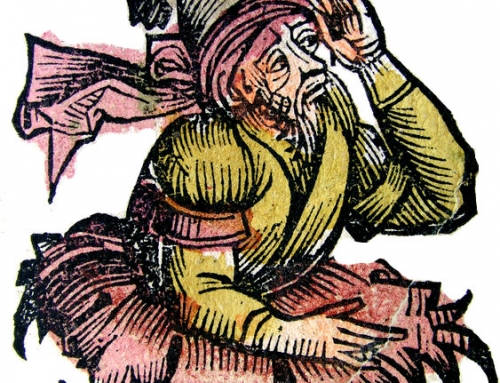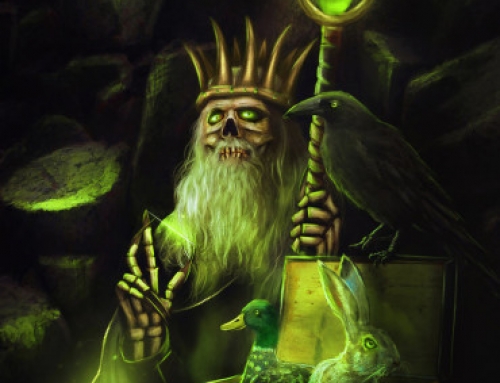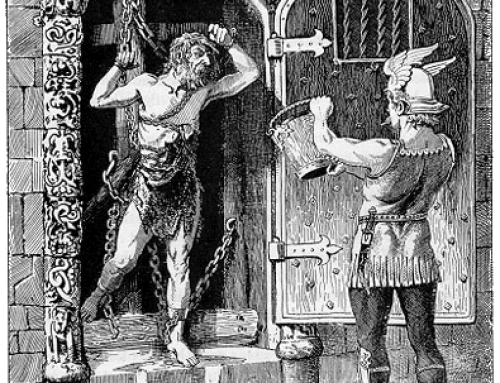This is a transcript for an episode of my podcast. If you like, you can subscribe to it on iTunes here.
The Once and Really Only that One Time King
This week on Myths and Legends, we’ll start at the very beginning of the Arthurian legends, way before Arthur himself was born. You’ll see that, in order to get people to like you, it’s somehow a bad idea to hire armed thugs to keep them from saying anything bad about you. Also, England learns for the very first time that Germanic seafaring warriors who worship a variation of Odin really really don’t respect the sanctity of monestaries. In the creature of the week, you’ll see that even if you’re threatening to kidnap children in the dead of night, it’s hard to be taken seriously if you and your friends take adorable hunting trips with tiny horses and even tinier, rainbow-colored hounds.
This is Myths and Legends, Episode 6A: The Once and Really Only that One Time King
This is a podcast where I tell the stories that have shaped cultures throughout history. Some are popular stories you think you know, but with surprising origins. Others are stories you probably haven't heard, but really should.
Historical Context
I know I said I would be starting the King Arthur story this week, and I would have loved to, but unfortunately I'm going to take about three steps back from the birth of Arthur, because the story doesn't start with him. Luckily, the story is an interesting one, and it’ll establish the world for all the future king Arthur shows. Also, we’ll finish the episode by meeting the famous British wizard who’s not Gandalf or Dumbledore.
This Arthur stint will take us from rule and death of Arthur's grandfather up until Arthur pulls that famous sword from the stone, revealing his true lineage.
Before I begin, I just want to say that I know I will get some things wrong, and I'm very appreciative of anyone sending me corrections, either at [email protected] or on twitter at mythpodcast. I'm not a scholar in this area, but someone who likes hearing and telling important stories. These legends are a tangled mess of different narrative strands. I'm absolutely going to try my best here, but please let me know if something is wildly off.

Why does this matter, you ask? Well, the actual dates don't really matter, aside from the placing of one particular person. Just know that at the time of the Arthurian legends, the Romans have largely abandoned England to defend itself against the barbarian hoards, and it's a land of petty kingdoms. In the early 5th century, a Roman general by the name of Constantine III, and, no, not that Constantine, declared himself emperor. He had a short and failure-ridden rule, but he's the person that Geoffrey of Monmouth kind of deems to be Arthur's grandfather, though the Constantine of legend bears very little resemblance to the historical figure.
Also, you'll need to know that many of our characters are Britons, and anytime I say Britons, I mean it that way until I say otherwise. These are the pre-Roman, Celtic people that occupied the island.
Constantine the pretty OK
Constantine, at the beginning of our story, was one of those petty kings. He, however, by sheer force of personality, rallied an army and fought off both barbarian tribes from across the channel and warring peoples on the island of Britain, bringing a peace to the land. There was a council held in Silchester where the other petty kings raised him up as the high king of England.
Years passed, and he married a woman who descended from a noble Roman family and educated by the Archbishop himself. Although the Romans had officially pulled out of England by this time, there isn’t a clear distinction of who is and isn't Roman. The Romans who occupied the areas early on married the locals and had children. As the Roman empire became less and less Italian, the meaning of Roman became more inclusive, so yes, even though the Roman legions had officially left, there were still Romans who had been stationed there and made the island their home.
Constantine had three sons by this woman, and they were named Constans, Aurelius Ambrosius, and Uther Pendragon, with Constans being significantly older than the other two.
Constans reached his teenage years, and his father ordered that he should go to the church of Amphibalus in Winchester and become a monk. The boy was angry. His father was essentially saying that, even though he was next in line, he would never be high king, because it would be a shame to him and an affront to the church if he was to ever take the boy from the order. He reluctantly agreed, though, and got in the habit of becoming a monk. Ok, that's the first and last habit pun I'll make.
For the other two, Constantine arranged for them to have the same tutor as their mother, and they were groomed for the throne. I don't know what he saw or didn't see in Constans, but it is very clear he intended for the boy to not ever be king.
One day, when handling the business of ruling, he received word that someone had an urgent message for him, but the man would not come inside, for some reason. The middle aged king decided to take the opportunity to take a walk. His guards followed.
The man was waiting in the orchard, among the grapes. Oh, him. It was a young Pictish man that had come on a private recommendation from one of Constantine's consuls. Constantine waved the guards off. He trusted the man, and would enjoy the stroll through the orchard.
His hands brushed the soft leaves as he got closer. He was old, and his eyes were not what they used to be, so he couldn't see the sweat on the man's forehead, the intensity of his gaze, or the tremor of his hand which would hardly leave his side. He did not see these things until it was too late. Something was wrong, and he turned to run. He heard a scream, and felt the dagger bite into his back. He fell to the ground, and only felt a few more of the stabs before the darkness took him.
By the time the guards ran out, the king was dead and the assassin was clearing the wall of the vineyard, disappearing into the forest. No one knew his motive, though that was of little concern. The years past had shown that the island needed a king – there needed to be a strong monarch, lest things fall once again into chaos. The young Aurelius Ambrosius and Uther Pendragon began to receive correspondences, correspondences they were too young to read, mind you, from earls and consuls, offering to support the children's bid for the throne. No one had even stopped to consider Constans. Such a thing would be shameful.
Enter: Vortigern
Enter a character who does not feel any level of shame – the man Vortigern. In some tellings, he is a lead administrator in Constantine's kingdom, in others he is an earl, in others a consul. Here, he'll be an earl, for simplicity's sake.
Upon hearing of Constantine's demise, he made all haste to Amphibalus, and made an arrangement with Constans. That the boy didn't want to enter the order was well known, and the consul could see that he was chaffing in the ascetic lifestyle. Constans, even having spent years in a monestary, knew the second most powerful man in the kingdom when he saw him. Vortigern said that Constans's brothers were still toddlers – Constans was the rightful king. He would use his considerable influence to dispose the people and the rulers to get him out of the monastery and promote his advancement to king. Constans replies that Vortigern had him at get him out of the monastery. All he would need to do is increase Vortigern's territories, which Constans happily agreed to. They rode that night for London.
There was no small degree of outrage when the other rulers found that Vortigern had rode to London and, in the absence of the archbishop, performed the coronation himself. Still, a king was a king, and they smelled weakness on the boy. Before long, London was swarming with petty kings and consuls, wishing to advise the boy, and he, having spent the last several years in a monastery, was unprepared for the overwhelming task of ruling a kingdom or the deviousness of court politics. He gave up his rule completely to his advisors.
Chief among those advisors was, you guessed it, Vortigern. Time passed, and the man was king in all but name, having control of the treasury and placing men loyal to him in the top stations of every city and fort. Still, that name is a pretty big difference, and Vortigern became tired of having to kneel to this boy he had put on the throne. He didn't want to first among equals, as he was with all the other advisors jockeying for power. He wanted the whole world under his feet.
All the soon-to-be-king's men
He went to the king with false reports. The Picts, a tribal people who lived in what is now present-day Scotland, were recruiting barbarian tribes to invade the kingdom. He advised the king that he keep some Pictish men on his court, not only to gain approval of the people as a whole, but to have spies if he ever needed them. He less asked the king for this, and more told him that this was happening. The king agreed as if he had a choice.
Weeks later, a hundred Pictish soldiers showed up, and the king accepted them into his household. Vortigern reluctantly agreed to look after the men and see that they had all they needed. And he did that and way, way more. They were given the best seats at feasts, amazing gifts, and respect above and beyond what they were given by anyone else. They began to think that this Vortigern guy was pretty great. Why was such a great guy at the command of such a spineless king? They saw how he executed the matters of state, and not this little monk. Oh well, as long as the presents and booze kept coming their way, they were happy.
An evening a few weeks later, Vortigern informed them that, unfortunately, the king had cut his pay once again, and he could not afford to keep fifty men, let alone 100 amazing awesome Pictish warriors, really, you guys are fantastic, in the splendor they so richly deserved. They should drink up...like get really drunk...so drunk that they don't think about their decisions, because tomorrow the party train is finally going to stop at the station, that phrase not at all being used because trains were about 1400 years from being invented.
Yeah, Vortigern said, the king was tough on him. Though he basically ruled the kingdom, letting the spineless monk have all the credit, the king was cutting his pay and shaming him. Here, have another drink. Vortigern says he was fed up with it, and would be leaving tomorrow. He wouldn't be able to keep giving them free food, drinks, and presents, and they would likely have to start living on their own or, if they wanted to, fall into the barracks with the regular soldiers. Your drink low? Here, have some more. Well, Vortigern says, time to go to bed. Hope nothing happens to the king in the meantime that changes this situation while you guys stay up drinking and stewing in your anger. Oh, and his room is four doors down on the left. Night.
The Pictish soldiers were incensed. This child is nothing compared to Vortigern. Something needs to be done. Vortigern deserves to rule this country as he already is, and, more importantly, they deserve to keep the beer and presents flowing. They decide, in their heavily inebriated state, that they have swords, they're in the king's house. Let's go solve this problem – and solve the problem they do.
Minutes later, Vortigern is sitting up, waiting, when Pictish soldiers explode into his bedchamber carrying dripping candles and the dripping head of king Constans. Vortigern puts on a show of weeping and stroking the king's hair for anyone who might be looking, and the Pictish soldiers are confused. Didn't he say the king was causing all their problems. They are even more confused when the king's guard barges in, swords drawn, and Vortigern screams that they've killed the king! Arrest them! What?
Vortigern turns on his army
What follows is exactly what Vortigern had planned. He ordered the Picts executed for killing the king. I can't imagine they were given a trial, but even if they were, it's not like he told them to kill the king, but they were so far gone that they probably couldn't even remember that much. When others began looking around for the next king, they went to Ambrosius and Uther, but found the boys gone. Whoever had them in their charge was prudent, and fled with the boys across the channel to Lesser Britain, or Brittany, on the continent, out of the reach of Vortigern's knives.
This solved short-term problems for Vortigern, but created some long-term ones. Unfortunately, he will display none of the intelligence or long-term thinking he used in winning the throne when he was sitting on it, and makes many, many terrible decisions. And yes, that's right, he becomes king. With the rightful heirs in exile and Vortigern having consolidated power and money for himself under Constans, his rule was a forgone conclusion. The court of public opinion was against him, though, and the people saw the machinations that had led to Vortigern sitting on the throne. There were whispers that he even hired the assassin that had murdered Constantine.
King Vortigern, now sitting on the throne, starts to see problems everywhere. The Picts are, to put it lightly, not thilled about him using their people to gain the throne and then executing them, and are making to invade from the north. Coupled with that, his people hate him, and there are whispers in the taverns and an palaces alike of maybe bringing the princes back from exile and setting them on the throne. In fact, the spectre of revolt and the resurgence of Constantine's children will be a constant bogeyman for the treacherous king. Vortigern needs to do something. He needs an army to keep him safe from enemies at home and abroad.
Vortigern gets a new army

Essentially, the Saxons were a germanic tribe that, while helpful at first, ended up ruling the island of Britain, pushing the Britons, still with an O, to Wales and Ireland. This is really only first contact, though, and, like I said, they start out as helpful.
Three galleys land in Kent, and the King goes to greet these travelers, who are tall and fair. He learns that they come from a land called Saxony. They are led by two, called Hengist and Horsa. Vortigern learns that they left their land because of overpopulation, and they were pushed out to find a new home. Vortigern says, wow, you guys look strong. Want to help me with some attacking armies in the north? They make a quick assessment and see that they probably couldn't take London as it is, being that they only have three ships full of men, so they offer to help Vortigern in anything he needs and vow to be his subjects.
Fast forward to the Picts and Scots invading from the north, and the Saxons coming to the aid of the Britons and fighting more valiantly than them in every way. They easily route the invaders. Riding back to London through every hamlet, village, city, and fort, Hengist hears whispers from the people of Vortigern. How this costly war was all his fault for his treachery. How someone needed to do something about this king.
Hengist doesn't do what you think, though, and goes to Vortigern and tells him what he's heard. Vortigern's people hate him, and it was only a matter of time until everything came crashing down and his earls banded together to put this Ambrosius at the head of an army and beheaded Vortigern. Vortigern says, yeah, I know, it's a huge problem and it's all I think about. Hengist has a solution.
If Hengist were to bring more of his people over, Vortigern would have a huge army loyal only to him (and Hengist...but...don't...don't worry about that). The Saxons would keep foreign armies at an arm's length a well as be a very visible deterrent for seditious talk at home.
Vortigern says, yeah, that sounds great. The people hate me, so to get them to love me, I'll just settle threatening pagan warriors they see as barbarians in their lands, to essentially hold a sword to their throat to keep them from saying anything bad about me. I'm such a great king.
Hengist smiles, and sends letters to his friends, chieftains of other people in the same area – the Angles and the Jutes. He says that the land is rich and the people are weak, so they should send all the people they can over. They come over en masse, and settle the land. They become a mixed people eventually going by the name Anglo-Saxons, but I'm just going to stick with Saxon for now because it's simpler, and they are mainly led by Hengist, who is a Saxon.
Driving his public image even further into the ground, Vortigern marries the daughter of Hengist in a pagan ceremony, which both conveys to his people that he values the relationship with these foreign occupiers more, as well as places him in sort of a lesser position to Hengist, who is now technically his father-in-law. Keep in mind, too, that the Britons are a Christian people, so to have their king not only accept these pagans who worship Woden, but marry them in a heathen ceremony was absolutely unacceptable.
Killing his public image and leaving it in a ditch, he decides to give Hengist the kingdom of Kent as a dowry. The only problem? Well, there was already a governor. No matter, the Saxons could easily drive him out. Hengist goes to Kent and deposes the man in charge, sparking greater outrage among the people, and leading all the nobles to fear their position. If the governor of Kent could have his lands ripped from him, it could happen to any one of them.
Oh, and Vortigern had a wife previously, but she died a long time ago, and so he has three sons, Vortimer, Passent, and Vortiger. I'll try to make it clear who I'm talking about as we go. They side with the Britons in their hate of the Saxons and their new pagan mom.
Mo' Saxons Mo' Problems
Hengist begins to lord his new father-in-law status over Vortigern, and the king consented to allowing more and more of the men come from Saxony to settle and rule the lands closer to Hadrian's wall. Years passed, and the Britons became wary of the Saxons. It was starting to become difficult to tell who was a pagan worshiper of the germanic god Wodan, and who was a Christian. Worse, the Saxons, in their large numbers and from their positions of power, began to oppress the native Britons. They gained more and more land, and it became obvious that Vortigern was just a puppet of these foreign invaders.
His son, Vortimer, though, held himself as a true king. He was old enough now, and word reached Vortigern first that his son was speaking treasonous talk against his father and the Saxons. Then, that the deposed nobles had crowned Vortimer king, essentially saying that Vortigern was dead to them. Then word came that Vortimer had raised an army, then that he had driven the Saxons from the wall up north, then that he was coming to London.
Vortigern, though inextricably tied to the Saxons, couldn't raise a force against his own son and nobles. Luckily, or unluckily for him, since it didn't even occur to Hengist and Horsa to consult the king, the Saxon armies in London met the Britons in several skirmishes, with Vortimer winning them all.
The Saxons knew they would be summarily executed if they did not think of something. The whole island was rising up against them. They decided to put Vortigern, the king, in the extremely awkward position of negotiatiating with his usurper son for the Saxon's safe travel back to Saxony.
It was made all the more awkward when, as father and son were sitting down talking, the Britons learned that it had all been a ruse, and as soon as Vortigern had left, the Saxon armies had taken off across the channel, abandoning their wives and children in Britain.
Vortimer went to work in his father's stead. Vortigern wasn't imprisoned or anything, but after being king in all but name, he was now king in name only, with his son undoing the pronouncements of the previous decades. The Briton nobles were restored to their stations, he rebuilt churches that the Saxons had torn down, and restored to the people all that had been taken from them.
Things then take a dark turn for Vortimer. Remember, the Saxons had left their women and children, including Rowen, the queen – the pagan stepmom of Vortimer. Well, much like in the saga of the Volsungs and seemingly any tale in folklore where there is a stepmother, she's pretty evil. She can't get close to Vortimer, but the Saxons had just spent years seeping into this society. She finds someone willing to drop a some poison into Vortimer's drink, and he falls ill. His last words were of how he would like them to put his tomb on the coast facing the continent, where the Saxons used to land. That way they will remember their defeats if they every try to return, and will turn back. His men nod in tears, saying they will absolutely do just that. Then his eyes close, and they inter him in London, completely disregarding his final wishes.
With Vortimer dead, the throne reverted back to Vortigern because I guess the plot demands that he remain king. It doesn't make any sense to me that the Britons could not find literally anyone else. He was just deposed by his son with the support of everyone in the country, but no, he should really still be king. He's somehow surprised by the fact that everyone loathes him, and complains to his wife who says that he's definitely going to be murdered in a revolt. Hey, I have a great idea! You know who likes you and is really strong? Yeah, my brother, Hengist. With Vortimer dead of what was definitely a mysterious sudden illness and not poison, he'll probably come back and keep your people in line. You know what you should do, though? You should have him come back with a smaller force, that way he doesn't scare your little subjects.
If at first you don't succeed, invite the dangerous Saxons back to your land
Thinking that what got him hated by his people and deposed the first time might just work a second time if he does it nearly exactly the same way, he follows his wife's advice. Unbeknownst to him, though, his wife, Rowen, is also sending letters to her brother.

Vortigern thinks that maybe his Saxon father-in-law and wife, his Byronic kids by his first marriage, and his country that hates him can all live happily under one roof like some violent medieval Brady Bunch, and so he assembles all the nobles that he can at the meeting place. They're all tired of Vortigern and the war, but maybe they can put all of this behind them. They all agree to meet at a monastery, because Germanic seafaring people who worship Odin absolutely respect the sanctity of Christian places in general and monestaries in particular.
Treachery of the Long Knives

It starts amicably enough, with the Saxons and the Britons mingling amongst each other and talking. When the Saxons weren't driving them from their lands, tearing down their churches, and oppressing their people, the germanic barbarians weren't bad.
That was until they heard a shout come from the head table, it was someone yelling, “take out your swords.” Swords? They were supposed to be unarmed. The Saxons dropped their drinks, and their hands dart under their robes.
The attendants outside hear the shout and the screams that come after it, and race inside, clubs drawn, to see the massacre. Saxons had drawn daggers from their robes and stabbed the man next to them. Those that put of a fight then had to struggle with two or three of the Saxons whose target didn't, until finally succumbing to the knives.
The attendents yelled and charged, attacking the Saxons, and in the resulting chaos, Hengist escaped with his knife to Vortigern's throat. That day, over 300 barons and consuls, the rulers of the Britons, were killed. The Saxons came out the victors, though just barely.
Hengist got a written order from Vortigern, in chains and under threat of death, that the Saxons were to take Essex, Sussex, Middlesex, as well as many other areas. They then released him into the wilderness.
He followed along back to London on foot, and with every village he could see the desolation of the Saxons. Churches were burned, and anyone who dared to resist was trampled underfoot, sometimes literally.
His advisors and others still loyal to him found him on the road, and they told him London was lost. The Saxons had invaded during the peace conference, and only a few of the kings attendents had escaped with their lives. They were going to the west of the island, to Wales, to regroup and think of what they would do.
A Sacrifice
They went to the highlands of north Wales and they attempted to construct a fortress atop a high, cold mountain, but whenever they would try to start the wall, they would find the foundations crumbled the next day. Vortigern tries all manner of enchantments, working with magicians, but nothing would keep the wall together. He's incensed, and goes to the magicians. What if the Saxons come tomorrow? What would he do then? They tell him that it's because he's not using the right materials. For this tower to stay together, they say they need the blood of a boy without a father to mix with the mortar. I know there's probably a reason for this, but it just seems to me like they're stalling for time, trying to get the king's men to comb the Welsh highlands looking for a child.
Well, days later they actually happen to find one. When traveling through a small village surrounding a monestary, they hear one boy berating another. The older boy says that he's decendent from a royal race, and no one even knows who the father of the other is, so he should mind his manners.
This is exactly what they've been looking for, and they tap the shoulder of a bystander. Who's that boy, there? The smaller one.
The bystander says everyone knows who that is. He's the grandson of the cursed king of Dimetia, and the illegitimate son of one of the nuns in the monestary. His name is Merlin.
Next Week
Next week on the show, it's the origin story of perhaps the most famous fictional wizard in a country known for its famous fictional wizards, and we'll see this possible son of a demon meet some dragons and put king Vortigern in his place.
If you’ve enjoyed the show, please let me know by leaving a review on iTunes by going to itunes.mythpodcast.com. Thanks to the exquisite lady, Mikkat Creep, and t. tsai for the reviews, and yes, I will absolutely do the original story of the little Mermaid. I was actually going to do it when I did the Mulan episode, but it is surprisingly really dark, and since we just finished up the hyper-bloody Viking legends, I wanted to do something a little more upbeat. I’ll definitely do it after this stretch of Arthur episodes, though.
I’m really open to requests from anyone so please let me know what you want to hear. Let me know over e-mail at [email protected], on twitter at mythpodcast, or on the site. Links to all these things are in the show notes.
The Creature of the Week
The creature this week is kind of similar to a couple we’ve seen in the past, but is interesting enough to warrant its own segement. They are the Mooinjer veggey, or “little people” from gaelic folklore, and they are tiny two-foot-tall fairy people.
Like many fairies, they are mostly harmless, but like to get into mischief. That mischief ranges from harmless to very very harmful and can include anything from tripping you up, borrowing things and not putting them back in the right place, borrowing things and not putting them back (a.k.a. stealing things), light kidnapping, and murder.
They are tiny, but have significant magical powers. They can turn invisible at will, naturally, and can enthrall you with their music. As mentioned previously, they are fond of kidnapping and like to steal unbaptized babies, especially good-looking ones, and leave changelings – sickly elf babies.
I normally joke about how you can protect yourself from these things, but this one is pretty dangerous. To keep their newborns from being taken in the night, Fairy Doctors advocated tying a red ribbon around its neck before bed, or leaving a, presumably cool, iron poker on the newborn. As the father of a baby that was recently a newborn, I can earnestly say this is a very bad idea and should be done by no one ever. These fairies don’t exist. Don’t tie things around newborn’s necks before bed or leave heavy metals on their chests. Really.
Moving on, the fairies go on little adorable hunts on small, full-grown horses followed by miniature, full-grown hounds of all the colors of the rainbow. If you sin, they can shoot you with little flint arrowheads which don’t hurt or leave a mark, but will kill you. You’ll know someone was killed by them by the blue mark on the body.
Like the Hidden Folk from the first episode, they are powerful on Midsummer’s Eve, and have led to a real-world response. In the middle ages, and even stretching into the 1800s, there was a such thing as a Fairy Doctor. Belief in fairies was so strong that there was a whole subset of healers dedicated to trying to cure illnesses wrought by them. The illnesses could have been brought about by the evil eye, or fairy wind, fairy arrows, or any number of made up ailments. You can trust that this person knows what they’re talking about, because their training consists of a trip to the spirit world to learn magical healing knowledge, credentialing you can’t just lie about and say happened.
That’s it for this week! The theme song is by the band Broke for Free, and the Creature of the Week music is by the venerable Steve Combs. Thanks so much for listening, and I’ll see you next time.








im a bit confused…. at the start you say Vortigern married Hengist’s daughter but later you say Rowen is his sister….. just looking for some clarification